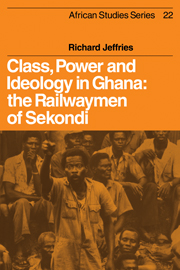
-
Select format
-
- Publisher:
- Cambridge University Press
- Publication date:
- September 2009
- November 1978
- ISBN:
- 9780511558863
- 9780521100168
- Dimensions:
- Weight & Pages:
- Dimensions:
- (229 x 152 mm)
- Weight & Pages:
- 0.39kg, 264 Pages
You may already have access via personal or institutional login
Book description
Although there is a growing body of literature on the process and potential political consequences of class-formation in Africa, there are virtually no detailed studies of the political attitudes and behaviour of African industrial workers. First published in 1978, this study analyses the political history and sociology of one particular group - the railway workers of Ghana's third city, Sekondi-Takoradi, who are renowned for their leading role in the Ghanaian nationalist movement and for their sustained opposition to the elitism and authoritarianism of post-Independence governments. In seeking to explain the ideological consistency which has informed the political activities of the railway workers, Richard Jeffries shows how, within a close-knit and relatively stable community, a keen sense of their own history has provided the basis for a shared political culture.
Contents
Metrics
Altmetric attention score
Full text views
Full text views help Loading metrics...
Loading metrics...
* Views captured on Cambridge Core between #date#. This data will be updated every 24 hours.
Usage data cannot currently be displayed.
Accessibility standard: Unknown
Why this information is here
This section outlines the accessibility features of this content - including support for screen readers, full keyboard navigation and high-contrast display options. This may not be relevant for you.
Accessibility Information
Accessibility compliance for the PDF of this book is currently unknown and may be updated in the future.


